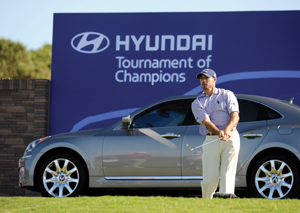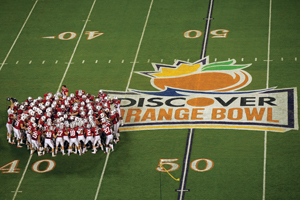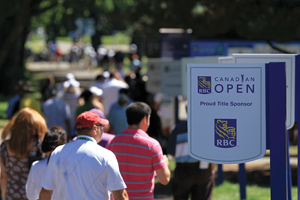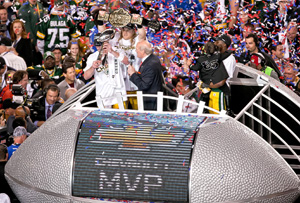Everyone knows that nothing beats the Super Bowl when it comes to the intersection of sports, advertising and TV. That makes this year’s star of Super Sunday advertisers — car companies — all the more compelling.
A record 17 brands from eight auto manufacturers bought up 12 1/2 minutes of ad time, establishing new precedents across the board, according to research by Kantar Media. That the spike in ad buying happened just two years removed from the teeth of a severe recession made it all the more remarkable.
The main message from Motown and beyond: Eminem and Chrysler aren’t the only ones enjoying major comebacks these days. So is the rest of the car industry, with banks and other financial services firms riding shotgun.
 |
GETTY IMAGES
Hyundai agreed to put its name on the PGA Tour's season-opening Kapalua, Hawaii, event through 2013.
|
As for bailouts, bankruptcies and backlash? That’s so 2009. When it comes to sports advertising and sponsorships, companies are beginning to spend again, albeit with a much closer eye on the bottom line, not to mention any and all ancillary rights and fringe benefits to be found. And, while it still takes much longer for companies in these and other sectors to make a commitment (and when they do, their investments are well below pre-recession rates), momentum is clearly on the upswing.
“As Mark Twain once said, ‘Reports of my death are greatly exaggerated,’” said David Abrutyn, managing director, senior vice president and head of global consulting for IMG. “The same can be said about banks and cars.”
Indeed, in recent months companies in the banking and automotive sectors have closed on a string of deals. Among them:
• JPMorgan Chase investing an estimated $300 million or more over the next decade as the lead sponsor at the soon-to-be revamped Madison Square Garden.
• A slew of smaller but significant sponsorships and ad buys, from General Motors’ Cadillac brand taking on title sponsorship of the World Golf Championships to TD Ameritrade agreeing to spend an estimated $20 million as part of a U.S. Olympic Committee sponsorship and related advertising during NBC’s coverage of the 2012 Games in London.
 |
GETTY IMAGES
Discover put its name on a BCS game. |
• Discover aligning with the NHL and putting its name on a Bowl Championship Series game, and American Express signing on as an NBA corporate partner.
• Hyundai Kia Automotive Group signing a three-year extension with the NBA and a four-year deal for title rights to the Sun Bowl. Also, Hyundai agreeing to put its name on the season-opening Kapalua PGA Tour event through 2013 and extending a long-running agreement with FIFA through the 2022 World Cup.
Plenty of companies shed or reduced commitments during the recession — GM, by some estimates, slashed spending by 60 percent — but, as the recent moves noted above make clear, the rebound is well under way.
Recent spending numbers prove the theory true.
During the first three quarters of 2009, sports advertising among automakers totaled $912 million. In 2010, it jumped 47 percent to $1.3 billion, according to research by Kantar Media (see chart, Page 16).
Financial firms spent less on sports ads than car companies, but with greater gains. For the same period — the first nine months of 2010 versus 2009 — sports advertising from banks and related financial companies zoomed 69 percent to $617 million.
Reasons for optimism
Optimism runs high for both sectors, although significant questions loom in the financial services category, experts say.
Auto prospects burn brighter for several reasons, starting with industry forecasts for continuing strong growth in sales as well as anticipated increases in the number of new product launches and redesigns, which necessitate aggressive advertising and promotion.
Auto and finance on the rebound
The following chart shows how sports television advertising by companies in the auto and financial categories has risen sharply since the early days of the recession.
|
| CATEGORY |
JAN. 2009-SEPT. 2009
SPENDING (000s)
|
JAN. 2010-SEPT. 2010
SPENDING (000s)
|
CHANGE
|
Automakers
|
$912,247
|
$1,342,534
|
+47%
|
Financial services
|
$365,446
|
$616,720
|
+69%
|
Total sports advertising
|
$2,120,271
|
$2,869,107
|
+35.3%
|
Note: Includes sports programming televised nationally on English and Spanish over-the-air and cable networks, and local spot broadcasts.
Source: Kantar Media
Beyond that, two major automakers — GM and Chrysler — shed enormous debt and unsavory union contracts by seeking bankruptcy protection in 2009. Both have since re-emerged stronger. In February, GM reported its first annual profit in seven years while making a strong run at once again becoming the world’s top-selling car company. Across the board, most carmakers have been able to improve their balance sheets while weaker dealerships closed. Pent-up demand is also playing a part, as beleaguered consumers who have delayed buying cars in recent years are now more likely to consider an upgrade.
Winning over those prospective buyers calls for a proven method to connect with them. “Automotive and sports have been like soup and sandwich for years,” said Jan Thompson, vice president of the automotive group at The Marketing Arm. “[During the recession] everybody got burned and everybody got scared. Now everybody’s a lot smarter going into it.”
Tom McGovern, managing director at Optimum Sports, sees similar cause for optimism with the car companies. His clients include Nissan, a major advertiser in college football.
“Things have been cleaned up in automotive, with the balance sheets,” McGovern said. “The problems run deeper in financial services. Major firms are nowhere near what they looked like before. It’s more challenging and there are lingering effects.”
Driving sales with the Super Bowl
The 2011 Super Bowl ad roster included a record number of auto manufacturers running commercials.
|
YEAR
|
TOTAL AUTO AD
SPEND (MILLIONS)
|
TOTAL AUTO AD
TIME (MIN:SEC)
|
# OF AUTO
MANUFACTURERS
|
# OF AUTO
BRANDS
|
2011
|
NA
|
12:30
|
8
|
17
|
2010
|
$29.7
|
5:30
|
4
|
6
|
2009
|
$18.0
|
3:00
|
3
|
3
|
2008
|
$21.6
|
4:00
|
4
|
4
|
2007
|
$21.5
|
3:50
|
3
|
4
|
2006
|
$20.0
|
4:00
|
4
|
5
|
2005
|
$26.4
|
5:30
|
4
|
5
|
2004
|
$20.7
|
4:30
|
4 |
5
|
2003
|
$12.9
|
3:00
|
2
|
3
|
2002
|
$8.8
|
2:00
|
2
|
2
|
2001
|
$8.8
|
2:00
|
1
|
1
|
NA: Not available
Source: Kantar Media data
Still, it’s a long way from the early days of 2009, when U.S. Rep. Barney Frank ripped Northern Trust for hosting performances by Sheryl Crow and others as part of its PGA Tour sponsorship in California. ABC News and others spotlighted Bank of America’s backing of the fan festival at the Super Bowl that year, while companies such as Wells Fargo and Morgan Stanley took their names off golf title sponsorships while continuing to pay for those rights. In sudden fashion, amid spiraling debt and soaring unemployment, sponsorship became a scarlet letter.
Golf, a sport forever linked with affluent audiences and generous corporate hospitality packages, suffered as much as any sport, if not more. While some companies sought shelter from the golf contracts they had in place, others took on a more dramatic bunker mentality and left altogether. Among the departures: Friedman, Billings, Ramsey Group (FBR) and US Bank.
Fast forward to 2011. This spring, Wells Fargo, in yet another demonstration of shifting attitudes, plans to put its name on the PGA Tour stop in Charlotte after two years without a corporate title on the event. Wells Fargo inherited the tournament’s naming rights when it bought Wachovia but decided against keeping a company name on the tournament amid a national furor over sports spending by companies that received bailout money.
“The reason [companies] are coming back is very simple: It works,” said Mike Reisman, principal at Team Epic. “They got bullied and spooked by politicians who were trying to capitalize on the fact that a populist sentiment would be, ‘Companies shouldn’t spend on frivolous activities like sports,’ when in fact, companies spend on very strong, proven marketing methods, which are sponsorships. Big difference.”
Despite that sentiment, not everyone is comfortable discussing marketing and sponsorship spending just yet. A number of companies SportsBusiness Journal attempted to speak with for this story didn’t respond, while others — including Bank of America, Wells Fargo and MasterCard — declined to participate.
And while government scrutiny may be at greatly reduced levels, it hasn’t disappeared. In recent weeks, U.S. Rep. Betty McCollum made waves by calling for an end to Pentagon-related sponsorship of NASCAR drivers, including the team of Dale Earnhardt Jr.
Seeing opportunities
While some companies are ramping back up, others are taking advantage of the economic carnage to get in the game for the first time.
“As others fled sponsorship, we jumped in,” said Jim Little, chief brand and communications officer at RBC. “There was great value, there were fewer people doing it, and all the media that we were buying around sponsorships was more valuable because there were fewer competitive things for people to look at.”
 |
GETTY IMAGES
RBC has nine pro golfers as endorsers and has naming rights to the PGA Tour's Canadian Open. |
Since 2007, Toronto-based RBC has gained naming rights for a PGA Tour event (Vancouver’s RBC Canadian Open), become the official bank of the PGA of America, and signed extensive advertising contracts with the Golf Channel, Golf Digest and Golf World. The bank has nine pro golfers as endorsers, including Fred Couples, Morgan Pressel, Ernie Els, Jim Furyk and Anthony Kim.
The bank already had its name on the home of the NHL Carolina Hurricanes, tying into its U.S. hub in Raleigh. Those hockey ties have been strengthened with the recent launch of a community hockey program aimed at increasing youth participation in the sport. Spokesmen include current and former NHL players.
As much as anything, RBC likes the economic reset’s price-is-right effect.
“We are very value-conscious bankers,” Little said. “And I would even say Canadian bankers, so there’s no question that the context of tougher times helped us go from a ‘no’ to a ‘yes.’”
Sun Life Financial took a similar approach. Amid the scrutiny over financial services companies receiving bailout funds and sponsoring sports teams and events, the timing was perfect for finding an advertising niche in what is usually crowded territory, said Bill Webster, Sun Life vice president of brand strategy and development.
Less than a month before the 2010 Super Bowl, Sun Life signed a five-year, $37.5 million deal to name the game’s host stadium, which is also home of the Miami Dolphins. Other deals of late include an online and arena sponsorship with the Boston Celtics and backing PGA Tour golfer Hunter Mahan.
Webster echoes many car and banking executives negotiating sports deals when he points to the crucial tie-in elements of Sun Life’s recent deals: social media, heavy online elements and dovetailing philanthropy campaigns tying the organizations together. The latter serves to cement the ties between a sponsor and a team or venue, giving each side a feel-good community element that experts say is needed now more than ever with trust in the corporate world tainted by the litany of financial scandals and layoffs roiling Wall Street and beyond in recent years.
Sponsorships tend to work in incremental steps, with a gradual progression toward larger commitments, said Team Epic’s Reisman.
“Money seems to be coming back faster into traditional media and advertising,” he said. “People are going for the more tried and true.”
That is the sentiment at the networks (ask Fox after its Super Bowl haul of auto ads) and the regional sports networks.
“Our business is up; cars are leading the league,” said Ray Warren, executive vice president and chief revenue officer at Comcast Sports Group. “Banks are back and insurance companies never went away.”
Collaboration with properties
GM embodies all of the shifts in recent years, from financial mayhem (bankruptcy filing and a $50 billion bailout) to cutbacks (golf tournaments and Tiger Woods, among others) and into the current, much-ballyhooed new reality (dropping the U.S. Olympic Committee but committing to a hefty ad package on NBC for the 2012 Games).
The Detroit automaker is slimmer not just in sports, but all the way around. GM today has four brands of cars, compared with eight pre-bankruptcy.
The biggest difference GM sees is how leagues and others in sports have become much more willing to collaborate, ensuring success for both sides.
“I think everybody was shocked into a little bit different behavior and expectations,” said Steve Tihanyi, GM’s general director of marketing alliances, services and branded entertainment. “My hope is people don’t ever forget that.”
 |
ICON SMI
Chevrolet was front and center when Aaron Rodgers was named Super Bowl MVP. |
After opting against Super Bowl ads last year (other than the lower-cost pregame and postgame slots), GM roared back in 2011. From game MVP Aaron Rodgers checking out his Camaro convertible on the field to Chevy blitzes for the Volt, Cruze and an alliance with the “Transformers: Dark of the Moon” movie, the company was all but impossible to avoid.
Tihanyi said the company was featured for all the right reasons: “We had a lot to talk about.”
Now the talk among companies, leagues and the marketing agencies is about renewed discipline and focus for making sponsorships more effective since the recession. As Tihanyi and others point out, the key is to remember the lessons learned during the pain of the past few years. After all, sports retain the power of persuasion like few other things in a world of DVRs, iPhones, iPads and all the other distractions of wired life. That explains why TD Ameritrade made its decision to back the U.S. Olympic effort in less than a day.
“You do marketing for two reasons,” said Peter Sidebottom, executive vice president of product strategy and marketing at TD Ameritrade. “One is to win awards and the other is to win business. We do it entirely for the second reason.”
And that, to TD Ameritrade and plenty of others at the moment, means sports.
Erik Spanberg writes for the Charlotte Business Journal, an affiliated publication.







